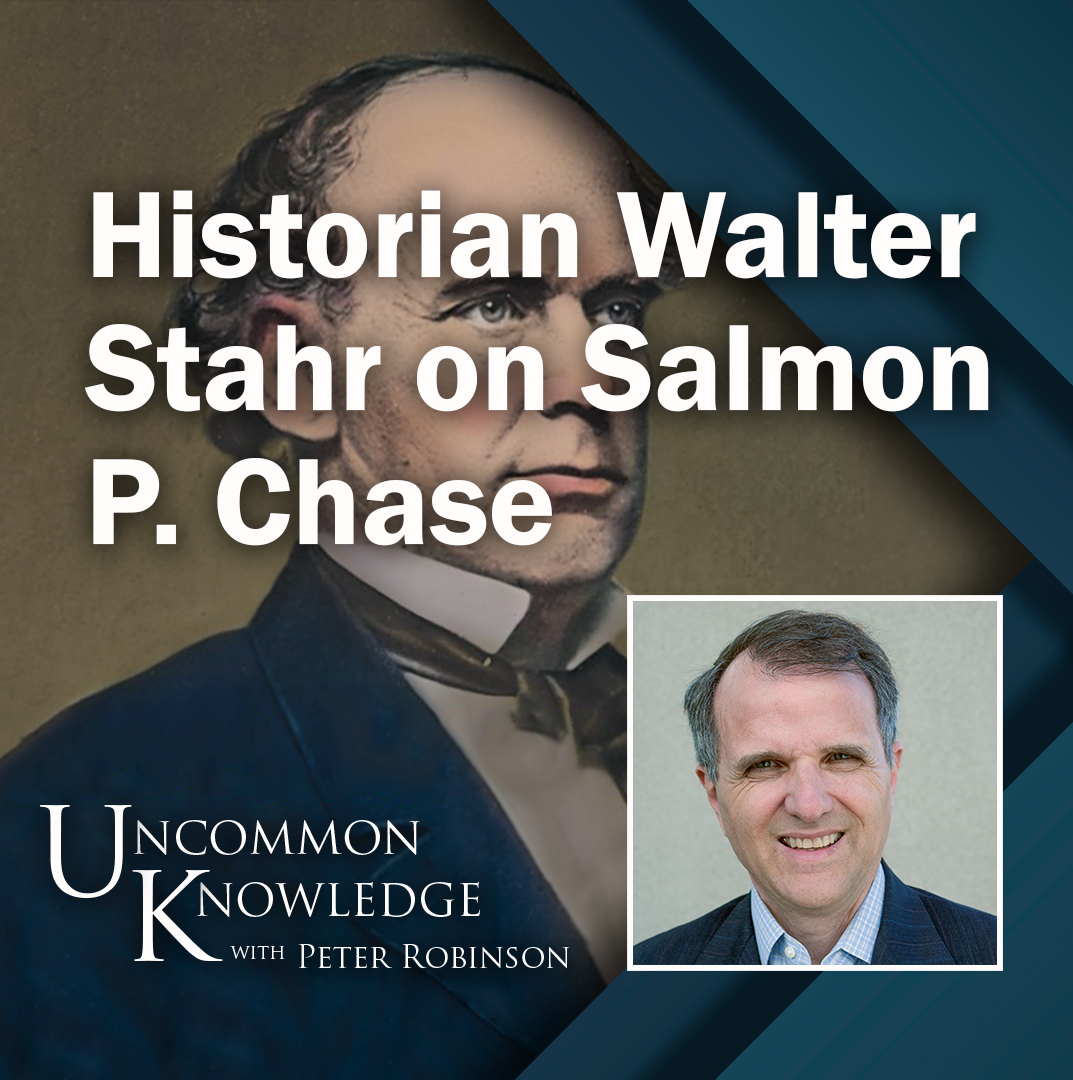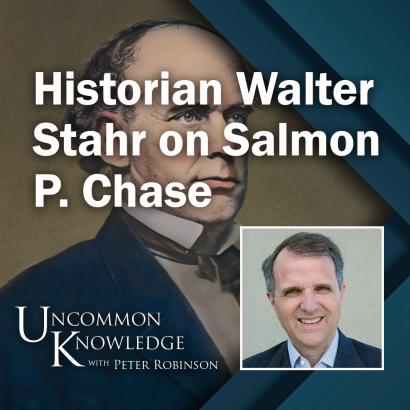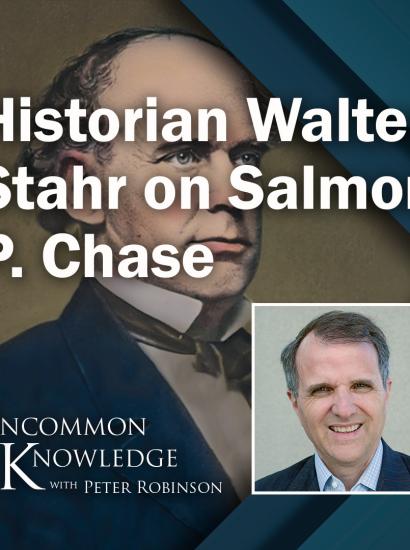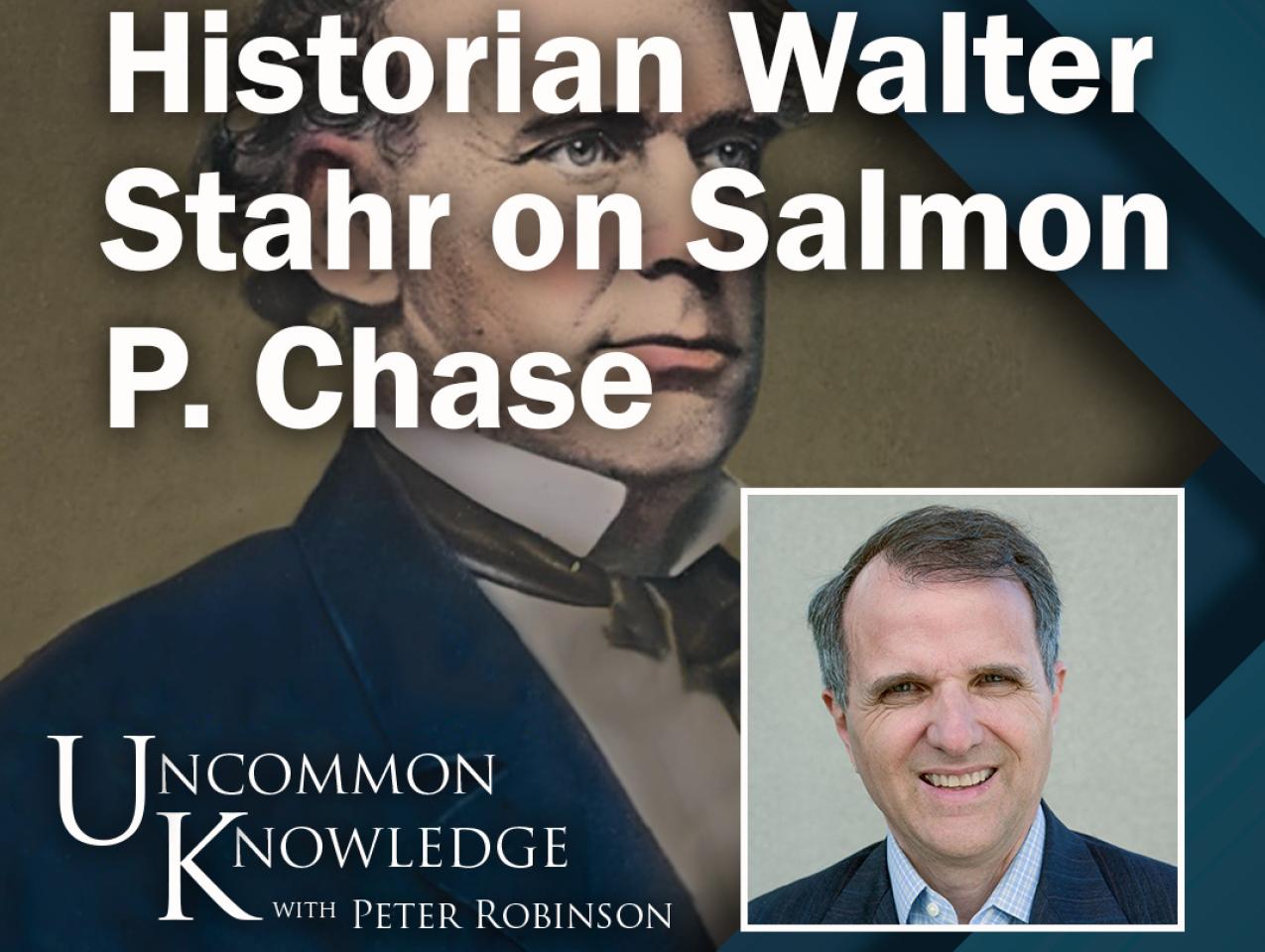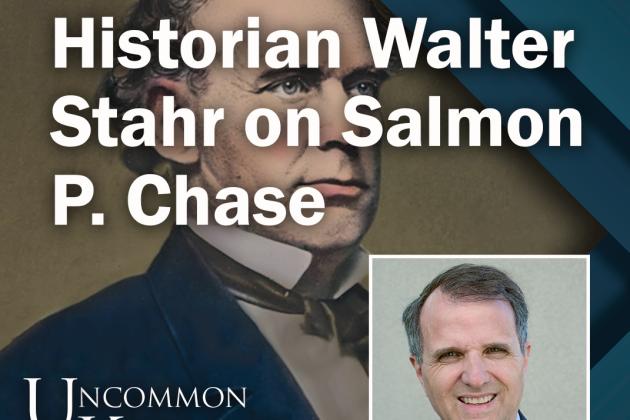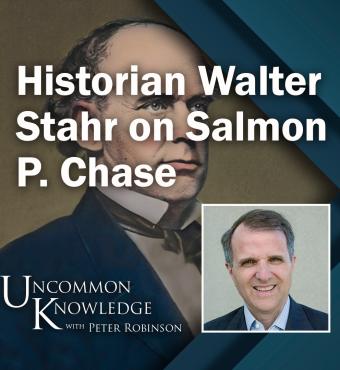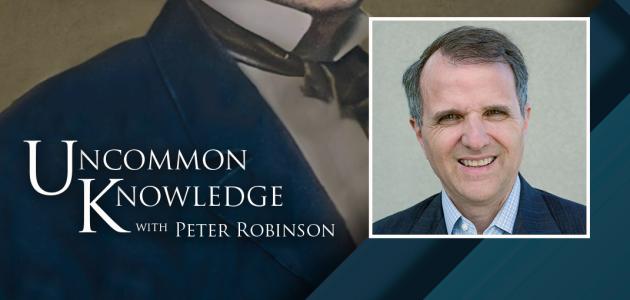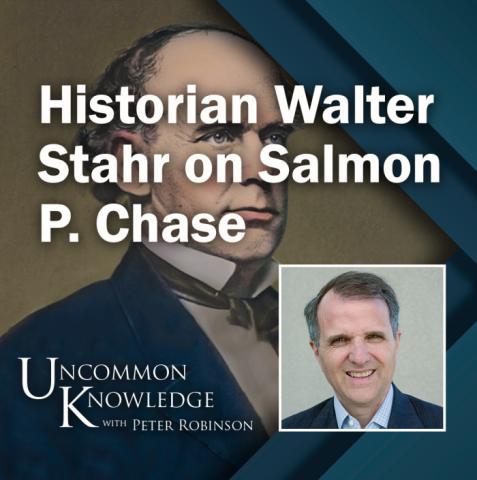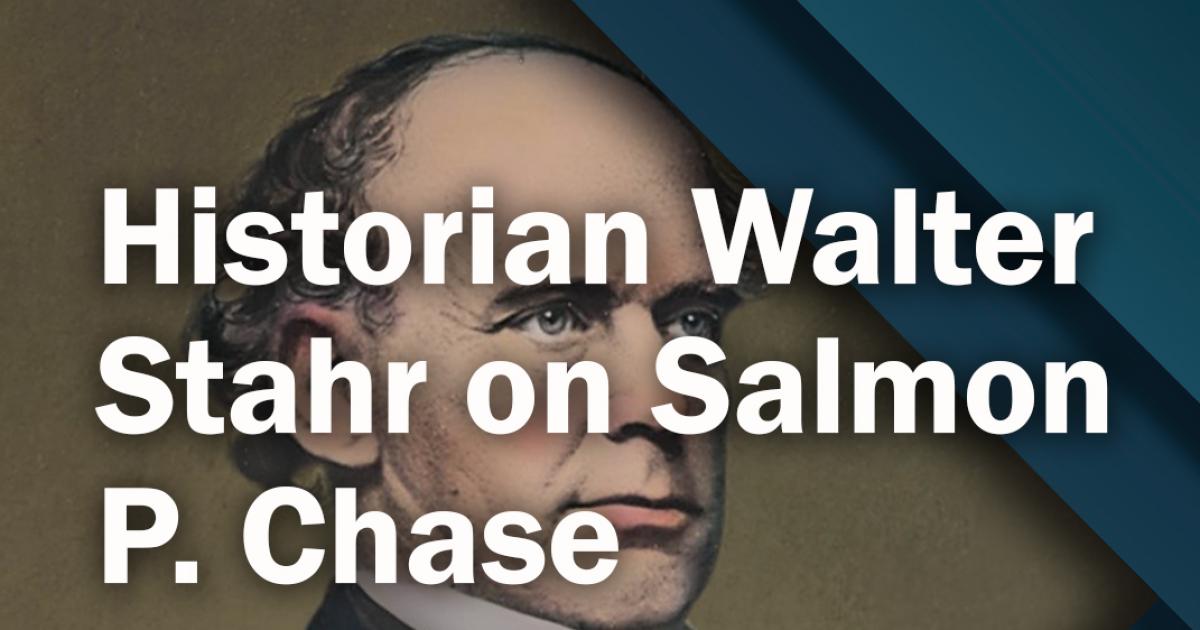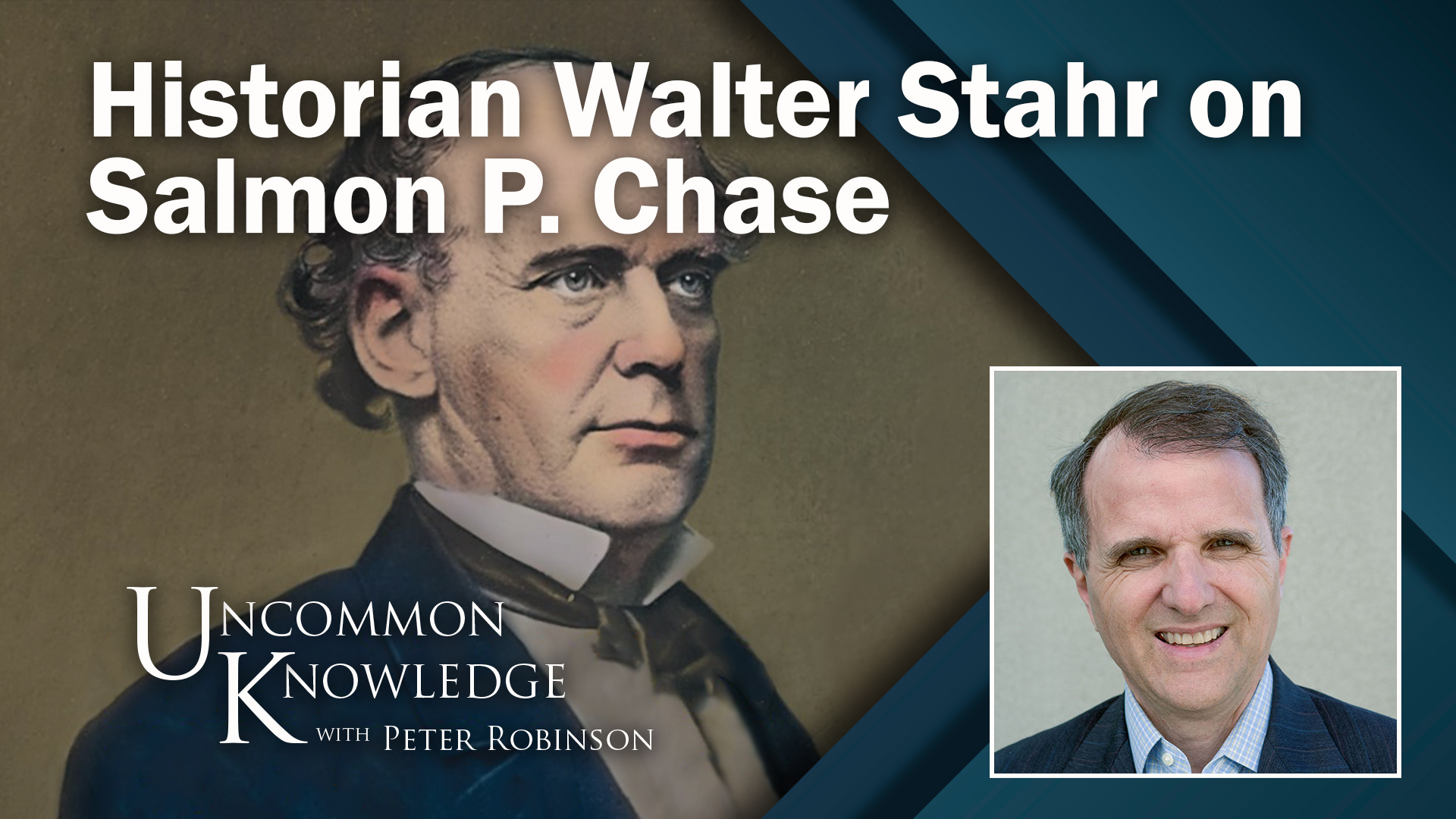Historical biographer Walter Stahr has given us definitive biographies of William H. Seward and Edwin Stanton, two of the ablest and most influential members of President Abraham Lincoln’s cabinet. Earlier this year, Stahr followed those books with the definitive biography of Salmon P. Chase, Treasury secretary under Lincoln and one of the country’s most important antislavery lawyers, one of the few who defended fugitive slaves against state and federal prosecutors. After his stint as a lawyer, Chase was elected to represent Ohio in the US Senate, where he was instrumental in helping to settle the slavery question in the United States. Chase also served as governor of Ohio and then as Treasury secretary, where he standardized the dozens of currencies then being issued by local banks and gave us a national currency and a system of national banks. Spend an hour learning about this man, who contributed greatly to the country but whom almost no one today remembers.
Recorded on April 15, 2022, at Dartmouth College, Hanover, New Hampshire.
To view the full transcript of this episode, read below:
Peter Robinson: From a recent review in The Wall Street Journal, "The acclaimed biographer Walter Stahr has given us definitive biographies of William H. Seward and Edwin Stanton, two of the ablest and most influential members of President Abraham Lincoln's cabinet. Now Mr. Stahr has followed his earlier works with an eloquently written, impeccably researched, and immensely moving biography of the third cabinet standout, Treasury Secretary Salmon P. Chase." On his new biography, historian Walter Stahr. Uncommon Knowledge now. Welcome to Uncommon Knowledge, I'm Peter Robinson. Historian Walter Stahr graduated from Stanford University in 1979, and from Harvard Law School in 1982. He practiced law in Washington and Hong Kong, returned to Washington from Hong Kong to take up a position at the Securities and Exchange Commission, which is where Walter and I became friends, full disclosure, and then returned to Hong Kong to practice securities law with fidelity investments. In other words, he had a remunerative, prestigious, international legal career, and then Walter Stahr gave it all up to write history. Walter has now written the definitive biographies of John Jay published in 2005, William Seward published in 2012, Edwin Stanton published in 2017, and Salmon P. Chase published this very spring. Walter, welcome back to Dartmouth College, the library of which you have used many times.
Walter Stahr: It is great to be back in this library. I will confess I've never been in this wonderful room before, but it's great to be in this room.
Peter Robinson: Let's start with a man's name. You note in the book that he himself called his name fishy, Salmon P. Chase. Salmon, of course, is an Old Testament name, it's in the genealogy leading to the birth of Jesus in Matthew, but how did he get stuck with it?
Walter Stahr: As he put it in one of the many letters in which he complained about this name, he was sort of a monument to an uncle who died not long before his birth. His uncle was Salmon Chase. His uncle had been a prominent lawyer in Portland, Maine. And so he got Salmon Portland Chase, which he toyed with changing to something more normal and almost all of the letters that he signed other than family letters, he would sign S.P. Chase.
Peter Robinson: Oh really?
Walter Stahr: Yeah. So if someone offers you a purported Chase letter signed Salmon P. Chase, it's probably a fake.
Peter Robinson: So, why does it seem fitting? Why is it fitting for us to be talking about Salmon P. Chase here at Dartmouth College?
Walter Stahr: Well, Chase's connection with Dartmouth in some senses goes back before his own birth in 1808, because four of his uncles were graduates, and by the time of his birth were already sort of achieving prominence. One of his uncles, Philander Chase becomes the first Episcopal Bishop of Ohio. So I think it was probably kind of faded that if Chase went to college, he would come here to Dartmouth.
Peter Robinson: All right, now, we have here a book that is in some ways like the life itself front loaded. You yourself write that Chase made his most important contribution as an anti-slavery lawyer and leader. He became treasury of the sec, treasurer, I beg your pardon, secretary of the treasury and chief justice of the United States with Abraham Lincoln. We will, of course come to that. But you argue in the book, I hadn't realized this, how tremendously important he was as an anti-slavery figure. A couple of passages from your book. Here's young Salmon Chase in the late 1820s. He graduates from this institution in 1826, so he's a young man. He's living in Washington with his legal mentor, the former Attorney General William Wort.
Walter Stahr: Actually current Attorney General.
Peter Robinson: He's current attorney, thank you very much. This is Salmon Chase himself. "Little cause exists for that sickly sympathy which many at the North feel or affect to feel with the fancied suffering of the slave. The master has a far more just claim upon our commiseration for he lives in continual apprehension of an insurrection." He has totally assimilated the view of the Southern slave holder in his late 20s. Now, here he is in a private letter not quite two decades later. "Slaves seem to be cut off from the sympathies of mankind. Our pulpits resound with the dangers of unbelief, the wants of the heathen. But alas, who cares or caring, dares to speak of the multitudes perishing in our very midst?" Which is as eloquent a statement on behalf of the dignity of slaves and all humans as exists in American history, correct?
Walter Stahr: Yes.
Peter Robinson: How do we go from A to B?
Walter Stahr: It's a complicated kind of conversion process, that's the term I use, which begins in the courtroom, begins with him representing the housekeeper, the half white, half black housekeeper of a friend Matilda who's accused of being a fugitive slave.
Peter Robinson: He's now in Cincinnati, so he leaves New Hampshire.
Walter Stahr: Leaves Washington, he goes to Cincinnati to start his legal career. He says that he'd rather be first in Cincinnati, quickly, rather than waiting 20 or 30 years for success.
Peter Robinson: Cincinnati in the first third of the 19th, first half of the 19th century, still more or less a frontier town.
Walter Stahr: Oh, a boom town, yes.
Peter Robinson: Population numbers some tens of thousands as I recall. All right, sorry, go ahead.
Walter Stahr: So in the Matilda case, he stands up in court, arguing for this woman's freedom among other things. He challenges the constitutionality of the fugitive slave law at which the opposing councils rises to a feet and says, what? Are we gonna talk about the constitutionality of the fugitive slave law to which Chase comes back with immediate heat and says, yes, because if it's not constitutional, there's no basis for holding this woman in prison. He loses the case, but he publishes his arguments in a pamphlet which then becomes kind of a template. So it starts in court, but it takes a while before he kind of leaves his promising political career as a Whig and says, no, thank you.
Peter Robinson: Give us two sentences on what the Whig Party stood for.
Walter Stahr: The Whig Party stood for what we would call infrastructure, federal spending on roads and canals. It stood for a national bank, it stood for largely a more unified national government, whereas the Democrats, the opponents, both north and south were much more states rights, infrastructure is okay but it has to be funded locally rather than by the federal government. So that's a very brief summary of the two main parties and he leaves one of those two parties to join a party that is a handful of eccentrics. In the 1840 election, they get 6,000 votes nationwide. So you can--
Peter Robinson: This far from being a crank.
Walter Stahr: This far from being a crank, correct. And when he joins that party in 1841, he immediately sets out to kind of change it and make it a political power.
Peter Robinson: And that party is called.
Walter Stahr: The Liberty Party initially and then the Free Soil Party of which he's the founding father and then the Republican Party of which he is a founding father, at least if not the founding father.
Peter Robinson: I'm quoting your book again. Salmon P. Chase, I just got to this and stopped because it's puzzling formulation. Although Chase was often called an abolitionist and although he had many friends among the abolitionists, he said consistently, he was not an abolitionist, but merely an anti-slavery man. So we have the abolitionists are centered in Boston, I think is generally fair to say they are. If there's a religious correlation, they're Puritan, they're Calvinist, they're precisely the religious strain in which he's raised up here in the upper valley of New Hampshire. What distinction is he drawing between the abolitionists and himself?
Walter Stahr: Well, the abolitionists were also definitely viewed as cranks and eccentrics and one of them, William Lloyd Garrison famously at a 4th of July rally burned a copy of the constitution and Chase was politically astute enough even as a young man to realize we're not gonna get far in America if we try to build a political party by burning the constitution. And so he said, look, we're gonna move away to the extent we can from abolition and we're gonna have a more practical political program, which he characterized in different ways. But one way he said it was, we're gonna divorce the federal government from slavery. We'll allow the slave states to have slavery as a state institution, but we're gonna try to get the federal government out of the slavery business, by for example, abolishing slavery in this district of Columbia, preventing the creation of new slavery of territories in the West.
Peter Robinson: So, of course we'll come to Lincoln in a moment was so say to ourselves, I mean, there's something a little unsatisfying about this step by step approach to us today. But then you read your book and you say to yourself, wait a moment, they had to live with this institution, it was all around them and the practical problem, here's one option, Garrison, tear down the country, rip up the constitution, start it all over. Well, that's not gonna work, we have to find steps and it's just fascinating to watch Chase and then Lincoln maneuver and strengthen their positions and find out what works and what doesn't. It's a portrait of actual human beings maneuvering in reality, surrounding reality.
Walter Stahr: Right and making judgements about how much can be accomplished in the relatively near term. What are the kind of easiest initial targets? The constitution gives Congress kind of complete control over the district of Columbia, it's a relatively small place, couldn't we in some way at least get rid of, at the time, this is real estate that both you and I know roughly where the Library of Congress stands today, there was a slave market. Imagine looking out of the capital and seeing human beings being bought and sold.
Peter Robinson: You've already touched on this. It's impossible to think of Chase. You can feel it almost in every line that he writes and you quote his correspondence a lot. He's a lawyer. He's acting within the law, he wants to act lawfully where necessary, he wants to change the law, but he's always engaged in close, realistic reasoning rooted in, well, who was it? Who is it who said that the life of the law is not logic, the life of the law's experience?
Walter Stahr: Holmes.
Peter Robinson: Holmes, it is Holmes. So the question is how good a lawyer is he? What difference does it make? You've mentioned one case where he defended a fugitive slave. We've got Chase's record, the case of Matilda, 1837, he loses it. John Vanzant, 1843, he loses it. Samuel Watson, 1845, he loses it. He loses, I think, only all, but one of these cases.
Walter Stahr: All those fugitive slave cases.
Peter Robinson: So what good is it doing? What difference do these cases make?
Walter Stahr: Well, just digress for a moment to say this isn't his whole legal practice. He also is a banking lawyer and a general commercial lawyer and he's a pretty good one. I mean, people hire him to represent them in the United States Supreme Court and that doesn't happen unless you're a pretty good lawyer. These cases are about a little bit like dissent in the Supreme Court today. These are kind of putting down a marker which maybe someday in five years will begin to become a respectable minority opinion and maybe someday will become a majority opinion. And there's for him, the politics and the law are always very closely together.
Peter Robinson: As for Lincoln.
Walter Stahr: As for Lincoln. But Chase, as you mentioned just a little while ago is much earlier involved in anti-slavery than Lincoln. Lincoln is very quiet about slavery in the '40s and into the early 1850s.
Peter Robinson: We'll come up to Lincoln in just a moment, he does become a hero to one group of people. Tell us the story of the silver pitcher, the silver pitcher.
Walter Stahr: So, after one of these unsuccessful fugitive slave cases, the Black community of Cincinnati wants to thank him for his work, both in the cases that we know about and I think in a lot of cases that we don't even know about just helping landlord tenant issues for Blacks in the community. And so they could--
Peter Robinson: By the way, I'm sorry, but he had a lot of face to face contact with African Americans at a level that I'm going to guess would've been unusual for a white man of standing, of means. Is that not true?
Walter Stahr: Oh yes, absolutely.
Peter Robinson: In other words, this is not just abstraction, he believes he treats these people as human beings, as fellow citizens, right?
Walter Stahr: I mean, he's not completely without racial prejudices, but he is for, as you say, for a white man of standing much more often with and working for Blacks than almost anyone else in Cincinnati. And that's why the Black community of Cincinnati creates this beautiful little silver picture, it's now in a museum in Cincinnati and they present it to him at a ceremony, at a Black church, a Black barber gives a little speech thanking him on behalf of the Black community and then Chase gives a little speech of his own in which he, among other things says that he wants Ohio to repeal the provision of the state constitution that prohibits Blacks from voting and that he favors what we would call integrated schools, Black and white children attending school together. And he prints this as a pamphlet and it then becomes a tool for his political opponents. In every subsequent campaign that he runs, this pamphlet is quoted against him. Don't vote for Chase, he even believes, I won't use the word that Black and white children should go to school together, he's that far out.
Peter Robinson: So again, this is something we'll come to because he's accused again and again, and again, particularly when he's a member of Lincoln's cabin of being over ambitious. Of permitting ambition to dominate his thinking and behavior. And yet early in the career, he's taking one political risk after another. There's nothing quiet about this, he's not holding back.
Walter Stahr: And I think that it's a very peculiar kind of ambition when you take positions like these that are so unpopular and you know they're unpopular and you put them in print in a way that they're gonna be quoted against you for the rest of your career.
Peter Robinson: Chase serves a term in the Senate representing Ohio. Two big efforts while he's in the Senate to settle slavery, to get it done. The compromise of 1850 admits California as a free state, but for the Southerners, it strengthens the fugitive slave law. Chase speaks in 1851. "Every man who has an eye to see or an ear to hear knows that the question is not settled. It is more unsettled than ever." Then comes the Kansas Nebraska Act of 1854, which opens the states of Kansas and Nebraska to slavery by popular vote. And so now we've tried saying, this state comes in free this, no, just leave it to the people who settle those states.
Walter Stahr: Well and it's actually a bigger territory than that because it's called the Kansas Nebraska Act, but we're talking about essentially everything kind of Kansas, Nebraska, and then north and west to the Canadian border and the Rocky Mountain. So it reaches all the way to Montana, it's a huge tract of territory.
Peter Robinson: And Chase calls this a criminal betrayal of precious rights. Two big efforts to settle the slavery question and he's on the wrong, I beg your pardon--
Walter Stahr: He's on the loosing side.
Peter Robinson: He's on the losing side of each. How do those defeats affect his thinking? How do they affect his political career?
Walter Stahr: Well, how to put it, his thinking about these issues remains the same as he writes after the compromise of 1850 to his friend, right is right and it will triumph in the end. And in terms of his political career, you could argue that in a way, these defeats make his career because particularly in the 1854 debate about Kansas Nebraska, he's the leader up against Senator Steven Douglas. And so he becomes more prominent. And when Northern outrage over the Kansas Nebraska Act leads to kind of a total reshuffle of the political parties and the Republican Party emerges, he's right there on ground zero of the formation of the Republican Party.
Peter Robinson: So, let's come to that now. He's elected governor of Ohio in 1855. He takes office and talking to a historian, how you wrote 600 pages and got all the details right when I can't, okay. 1855 he's elected, takes office in 1856. He does so as a Republican. 1856 is the first year, unless you're going to correct me on this, but it's the first year Republicans field candidates under the Republican banner. And so first question is about the party itself. Steven O. Douglas, whose later Lincoln's great nemesis, Senator Douglas of Illinois says, "No sane man can close his eyes to the fact that this great Northern party, the new party, the Republican Party, which is being organized on sectional issues, contemplates servile insurrection, civil war and disunion" Was he correct? In temperate, but was he correct?
Walter Stahr: Was he correct? Well, in a sense on sectional issues, certainly there were no southerners who were lining up to join the Republican Party. So in the sense of saying that this was a party that was only gonna find adherence in the north, yes, he was correct. But the remainder of the charge, particularly if Chase were here, he would take deep on bridge and say, no, no, no, no man loves the union more than I do and the Republicans do not contemplate disunion. I mean, what Douglas is saying though in a sense is right, because when the Republicans, I don't know, I'm getting a bit ahead of this.
Peter Robinson: No, no, go ahead.
Walter Stahr: But in 1860, when a Republican president is elected, well, then we do have disunion, Southern states succeed and we do have a civil war starting in 1861. We don't have what, when they say servile war, they mean sort of slaves rising up and slitting the throats of masters in the night. And by and large, that did not happen in the civil war. They're thinking back to what happened in the Haitian Revolution.
Peter Robinson: I see, okay.
Walter Stahr: But many people including Chase thought that if there was servile war, that would happen.
Peter Robinson: That the moment would come.
Walter Stahr: That the moment would come when white women would wake up to find their children in pieces.
Peter Robinson: When does it first cross Chase's mind do you suppose that war is more likely than not? I'm getting a little ahead, I wanna go back to his time as governor as well, but that's an important question.
Walter Stahr: I think that he honestly thought until he started to see South Carolina and the other states succeed in the--
Peter Robinson: So right through the election of 1860, he thinks maybe we can hold this all together.
Walter Stahr: And gives many speeches in which he says that and he's spent a certain amount of time already in the south, particularly Kentucky and Tennessee and he thinks that the love of union is far stronger than this succession sentiment. So, he thinks that all this secession talk, which is going on through the late 1850s and intensifies during the 1860 election, he thinks it's just talk and that he thinks that with the possible exception of South Carolina, that none of the Southern states will actually go through with secession after the election of a Republican.
Peter Robinson: All right, back to Chase's governor. If the man lived such an eventful life that, with almost anybody else, you'd say, all right, let's spend a good long time talking about what he did as governor, no Chase, there's too much else to get to, but give us a sentence or two on what he accomplished as governor, the importance of his time as governor to his career, to the cause.
Walter Stahr: Well, he uses the platform of being governor. I mean, governor has got more press attention in those days than they do now to continue to press the anti-slavery cause. By this point, as he predicted Kansas is in flames. And so he gives many speeches as governor about the situation in Kansas, particularly blaming the Democratic Buchanan administration, but he also presses on other issues. So notably sitting here at Dartmouth education. He talks about how it's the most important thing that the state does and he makes time to attend college commencements, he even finds time, I don't know how as governor to prepare and deliver a learned lecture on Galileo. I mean, he's a really an accomplished intellectual man.
Peter Robinson: Let's take a moment now. We're going with Chase in the Senate, Chase is governor. Lincoln's about to get elected, everything's going to change, but let's pause just for a moment to compare these two men, Chase and Lincoln.
Walter Stahr: In sort of 1860, the presidential year.
Peter Robinson: Let me set it up by quoting to you from your book. In 1858, two years before Lincoln's election Chase was one of the few out-of-state leaders that is leaders from outside Illinois, who supported Lincoln in Lincoln's losing Senate race against Steven O. Douglas. Speaking in Chicago and elsewhere in that memorable campaign. But even though Chase and Lincoln were now in the same party, the Republican Party, they did not yet agree on Black rights. This is 1858, two years before Lincoln is elected. Chase would never have said, as Lincoln did in 1858, that he was not "In favor of bringing about in any way, the social and political equality of the white and Black races." And Chase would never have said that he was not "In favor of making voters or jurors of Negroes nor of qualifying them to hold office nor to intermarry with white people." Chase is the man with a record of defending fugitive slaves, Chase is the man who believes, but really believes in racial equality, but in 1860, the Republican Party gives Lincoln the nomination. What is going on? Is Lincoln always on the side of Black rights, but he's being much more cautious politically thinking Chase could never succeed? What is going on here? And why does the Republican Party nominate Lincoln when Chase is the leader of the cause at this stage?
Walter Stahr: No, I think that Lincoln's 1858 statement of opposition to Black rights, I don't think he was just saying that because he was speaking in the Southern part of the state, I think that was really where he was at that point. He a little bit later in that quote, he says, look, there are two races and I'm white and so I favor whites being on top. I'm paraphrasing. But in order to win the presidency in 1860, the Republicans are not gonna get any votes in the south. So they basically have to run the table in the north. And that means carrying what we would call some swing states, Illinois, Indiana, Pennsylvania, New Jersey, all of those states are very close and particularly in the Southern bits of those states, you're just not gonna get votes if you can be Chase's pamphlet, the silver pitcher pamphlet can be quoted against you.
Peter Robinson: In Indiana to this day, you can hear a Southern accents in town, in the Southern part of the state.
Walter Stahr: So by nominating Lincoln who has much less of a record, after all, he's only served one, two year term in Congress at this point, he's given some strong speeches against extending slavery into the west, but on Black rights, he's really a white rights man you might say at this point. So it's not the first or the last time in our history that a party has opted for somebody who's more of a clean slate rather than somebody who has a lot of baggage.
Peter Robinson: All right. The election takes place, Lincoln wins and you write this. Lincoln could never have become president, again we'll come to the presidency, we'll come to the civil war but I'm talking about that election, Lincoln could never have become president without the vital work that Chase had done in the preceding decades.
Walter Stahr: Yeah.
Peter Robinson: Political work.
Walter Stahr: Largely building the parties. I mean the legal work, as I said, these are kind of two sides of the same coin, but of the two, the political work is by far the most important. It might have taken another, without Chase, it might have taken another five years before the Republican Party got strong enough. I mean, Lincoln, just--
Peter Robinson: So you're gonna make the case, you insist on the case. No Salmon P. Chase, no President Abraham Lincoln.
Walter Stahr: Or at least no President Abraham Lincoln in 1860.
Peter Robinson: Now, he's elected, Lincoln's elected. He takes office in March. We get secessions, the firing on Fort Sumter. The war begins on--
Walter Stahr: Roughly a year, we're almost on the anniversary, the middle of April.
Peter Robinson: Lincoln nominates Chase to the treasury department. And you write, "By modern standards, Chase did not have the right resume to be secretary of the treasury for he had not headed a major financial institution." Why did Lincoln nominate him to that job?
Walter Stahr: They had much more of a sense in those days of the hierarchy of the cabinet. I don't think many, even relatively political folks can list the hierarchy of the cabinet. The secretary of state is position number one, secretary of the treasury is position number two. But in those days they did. And there was a bit of a custom of kind of naming people in how do I put it, in order of party seniority to these positions. So, for example, why does Daniel Webster serve as secretary of state? Well, he was, we're here at Dartmouth so we have to throw in Daniel Webster at least once.
Peter Robinson: Yes, of course, thank you. Thank you on behalf of all Dartmouth alumni.
Walter Stahr: Because he's the leading Whig at the time that he's named secretary of state. And so Seward is the leading Republican so he gets the top slot and Chase is kind of the number two Republican, so he gets the number two slot, secretary of the treasury. In those days, financial expertise was really not much of a prerequisite, although he had, I argue more financial expertise than most of his predecessors in the treasury.
Peter Robinson: I see, Salmon P. Chase again, your book. "Even the most experienced financier would've hesitated to take over the treasury in March, 1861 for the federal finances were in terrible shape. His predecessor, John Adams Dix reported to Congress in February, 1861, that he had only about $500,000 in the treasury and that he expected bills of $10 million in the next few weeks." I just asked why Lincoln nominated him, why did Chase take the job?
Walter Stahr: Oh, he really didn't want to take the job. As I mentioned earlier, he had just been elected to the Senate and he thought it would be just so much more pleasant to be in the US Senate, which would work in those days, about six months a year and then you could go out and give speeches and take vacations rather than running a bankrupt treasury department. And indeed there's some sources that suggest that Lincoln nominated him, he was immediately confirmed. And upon learning of this, he went to the White House and said to Lincoln, sorry, I don't wanna do this to which Lincoln said, sorry, it's gonna look really, really bad if you resign immediately upon my nomination and your confirmation and the treasury is bankrupt, I need your help. And maybe a civil war is coming, I need your help. And he like all of these people had a very strong sense of duty and he saw that his duty was to take the job.
Peter Robinson: So right up until 1860, he's a legislator. He spends six years in the Senate, he spends four years as governor, he runs for the Senate again, ends up a treasury instead, but in this whole period, this is a man who's rhetorical, he's a lawyer, he's a talker, he's a very high level talker and thinker, but his medium is words.
Walter Stahr: Not numbers.
Peter Robinson: Not numbers and also not, really not organization, he's not building enterprises, which there were people building enterprises in those days.
Walter Stahr: I mean being governor in the 19th century, I mean, you didn't have a huge bureaucracy underneath you. So yes.
Peter Robinson: So here's what he does during the civil war. I beg your pardon while he's at treasury during the civil war, he finances the civil war. He finds a way to increase federal outlays from 80 million a year to 1.3 billion. He gives us a national bank. This is a contentious issue for decades in American history, he does it and in a way that sticks and he invents a national currency. He transforms modern American financial life and the role of government in the life of the nation. And I see nothing in his life before that moment to suppose that he would be capable of these, I don't, substantive organizational achievements.
Walter Stahr: Revolutionary.
Peter Robinson: Yes, yes. So how does he pull all of this off?
Walter Stahr: Well, the financing, there's a certain amount of improvisation and there's some mistakes for sure. But the key moment is when he and a friend, Jay Cook hit upon the idea of selling government bonds in small denominations to the people, what we would call a war bond campaign and Cook is a master of publicity and people line up around the block to buy government war bonds in small denominations and that brings in hundreds of millions of dollars in the latter phases of the civil war.
Peter Robinson: I mean, that to me is in itself is fast in Europe, up to this point, whenever a czar or a king needs to finance a war, there's a small group of extremely wealthy individuals and bankers to whom they go and Chase solves his problem by going to the people, it's democratic in its nature.
Walter Stahr: There was actually one European precedent about three years before this Napoleon III had gone to the French people in a similar way. And so they did, and among Chase's papers are like French descriptions of us in French, he could read French quite well.
Peter Robinson: So the legal mind, he immediately searches for precedence, how do we do this?
Walter Stahr: You immediately, right? One of my legal mentors said that the beginning of all good legal analysis is plagiarism.
Peter Robinson: Quickly take us through--
Walter Stahr: The currency and the banks.
Peter Robinson: There's so much of this man, but I wanna at least touch on, I wanna touch on all of it really. So what's the importance of a national bank, in plural banks, excuse me, of the national bank system. And we take the dollar so completely for granted. Make us understand what it looked like before the dollar, and then tell us how he introduced it.
Walter Stahr: So taking the banks first, we'd had this, a couple of single controversial banks in American history. Andrew Jackson famously kind of destroys the second bank of the United States. But before that you had institutions chartered by states, very lightly regulated, often just going bankrupt without much warning. And he wanted to have national banks that had greater spread and greater depth and kind of pushes through a reluctant Congress, the legislation, the National Banking Act, which is the predecessor of all the national banks we know.
Peter Robinson: And my impression is Lincoln is, fine, you go to it, Lincoln actually isn't terribly interested in this.
Walter Stahr: Correct.
Peter Robinson: This is a Chase initiative.
Walter Stahr: This is a Chase initiative supported by some bankers, but as you can imagine, some bankers who run large state chartered banks are opposed to this, so it's not easy getting it through. The currency before the civil war, I mean, people talked about dollars and transactions were done in dollars, but if you had a large transaction at, you would be presenting a note issued by one of these state banks and there were more than 1,000 of them and they had more than 10,000 different types of notes. So if I flew in from California and tried to present a note from the First Bank of Los Angeles here in Hampshire, someone would say, well, where's Los Angeles? Does that bank even exist? Is that bank solvent? And if I could persuade them to take the note, maybe it would be at a 50% discount, but maybe the bank doesn't even exist and so I've worked a con on the shopkeeper, the note is worth nothing. It was the golden age of counter fitters because, and Chase had been thinking about this issue for a long time, I found some very early when a young man wrote editorials about currency and saying, look, the purpose of currency is to provide a stable way in which ordinary folks can buy ordinary stuff.
Peter Robinson: Chase and ambition. We have to come to this now. In many accounts, he comes down to us as a conniver.
Walter Stahr: Yes.
Peter Robinson: There he is, Lincoln's secretary of the treasury seeking the nomination to run against Lincoln in 1864. You quote him, you have here. He writes to his son-in-law. "I think that a man of different qualities from those of the President Lincoln will be needed for the next four years." And around the same time he writes to a friend, again, you quote this. "I claim no right to anyone's political support, but a very large number of citizens, most of them strangers to me personally manifest a strong disposition to require my services in another and higher sphere of duty than any I have here to fulfilled. I mean, the pomposity of that alone really puts you on guard, this man, there's a little self delusion and there's real. So, what does he think he's doing?
Walter Stahr: I think he actually does think that the next four years, I mean, by this point, you can sort of see that the union is gonna win. If not in 1864, then surely in 1865. And then he thinks that the post-war years are probably gonna require different characteristics than Lincoln has. But there is no question, there is also just some ambition and this is why I think that scholars sort of blame him in the 1840s and '50s for the ambition that he exhibits in 1864. But he does buy the buy when it all blows up and his candidacy ends in February '64, he writes the letter to Lincoln and says, look, I would perfectly understand if you want me out to which Lincoln responds, I'm not quoting here, but Lincoln response, basically, no, I don't want you out, you're doing good work as treasury secretary keep on and he keeps on until the end of June '64, when he finally resigns and not long thereafter, again, bears mentioning, he basically spends the fall of '64 on the campaign trail to ensure that Abraham Lincoln is elected president again. So yes, ambition, but also willing when the nomination has gone another direction to fall in line and to do his party duty.
Peter Robinson: Seward and Stanton and Chase and who knows how many you have yet to write about, all went through the same thing. I want that job, that man is a hick. He's not me and in the end, he's the man.
Walter Stahr: He's the man. And after Lincoln's death, Chase readily admits that. I mean, he hangs a portrait of Lincoln kind of in the place of honor in his home and he hangs immediately underneath it, a framed copy of the letter by which Lincoln nominates him to be chief justice and these are talismanic objects for him.
Peter Robinson: And with any other figure, we would be talking about the chief justiceship of the United States is the pinnacle of his career and with Chase and some, there's so much that's happened that it's a de new mall. After the death of Chief Justice Roger B, it's pronounced T-A-N-E-Y.
Walter Stahr: I say Tony, but other people say Taney.
Peter Robinson: Well, my father sailed on the US coast guard cutter, Roger B. Tony during the Second World War and he always pronounced it Taney.
Walter Stahr: Oh, well that gives me--
Peter Robinson: Incidentally, Taney is chief justice when Dred Scott is decided and the ship on which my father sailed has now been denamed. It's now in the Baltimore Harbor, they've taken off the Roger, now it's a number. Anyway, I was raised calling it Tony. Tony dies in 1860, well, however, his name is pronounced, we don't have to trouble ourselves with it again because he's dead in 1864 and the New York Herald warns Lincoln not to nominate Chase. The position of chief justice requires a lawyer of profound requirements, Chase is but a dabbler in legal law. Now that's foolish, but still they said it, it requires a man of calm judgment and unbiased opinions, Chase is a partisan. Now, they're they right.
Walter Stahr: They have a point.
Peter Robinson: And Lincoln nominates him all the same, why?
Walter Stahr: Well, a number of reasons. I mean, one to circle back Black rights. He knew that issues about Black rights, he didn't know exactly what the issues would be, but he knew those issues were gonna come before the court in the next five, 10 years and he knew that Chase would be on the right side of those issues. Second, the finances, he knew that there would be challenges to this complex set of federal laws and rules that had been passed during the civil war that those would come before the court. And as he put it like the day after the nomination, he said, Chase would surely be on the right side of those issues because he would merely be defending his own handy work. And third political pressure, is a wonderful, not long after the nomination, a Washington insider writes to a friend that Lincoln bears a grudge as faithfully as any Christian. In other words, he hadn't completely forgiven Chase for his ambition and his difficulty as treasury secretary but according to this insider, the pressure from senators to nominate Chase became very intense. It became essentially clear that if Lincoln nominated anyone other than Chase, the nomination would go down in flames, which he obviously didn't want to do, so he nominates Chase. So, there are a variety of explanations.
Peter Robinson: All right, but that's interesting that Chase, I mean, honestly Walter, he's not always a likable man, as he's easier to admire than to really. But by this point he has friends in Washington.
Walter Stahr: He does.
Peter Robinson: He's worked with Congress, he's worked with the senators and they're going to insist on backing him up. So there's a capacity for friendship.
Walter Stahr: Yes.
Peter Robinson: So as chief justice, he presides over the first impeachment trial of President Andrew Johnson. And yet for all of that, you write, I'm quoting you again. "When law professors list the great justices, they sometimes include Taney, but they do not include Chase. He served as chief justice of the Supreme Court for almost nine years before he dies in 1873. Again, in his case, it's almost a day new mom, but what do we grasp? What do we want to hold onto about his time as chief justice?
Walter Stahr: Well, there are a number of important cases, but for me to sort of create a unity, the most interesting, maybe the kind of Black rights cases. So one of the cases that comes to mind involves a young woman in Maryland. The day after slavery ends in Maryland, her mother signs a contract binding this girl, she's 12 at the time to serve as her former master's apprentice until she comes of age. And the payments from the master are gonna go to the mother until the final payment goes to her opponent, the end of her apprenticeship.
Peter Robinson: So slavery is abolished and the day afterwards she sells her daughter.
Walter Stahr: Correct. And Chase kind of in those days, in addition to sitting together as a Supreme court justices went around as circuit justices and Maryland is part of his circuit. He goes to Baltimore, especially to hear this case and it's prevented to him, the master is actually in the courtroom. I say, master because effectively he's still her master and Chase asks him, well, are you gonna present a case? And he said, no, I'm not gonna hire a lawyer and spend all the money. I think he maybe saw the handwriting on the wall, but in any case, the next day, Chase issues a short opinion saying, look, this apprenticeship system that has been devised in Maryland and affects not only this girl, but thousands of others, this is just slavery by another name and it's contrary to the 13th amendment, which had been enacted abolishing slavery and so her contract is null and void, she's free. And that's one of a number of cases in which, how to put it, you can see in Chief Justice Chase, the very anti-slavery lawyer who lost all those cases as you mentioned, I mean, I'm sure that--
Peter Robinson: There's a single golden thread through his whole life and it's Black rights, human rights.
Walter Stahr: Human rights, and on the subject of human rights, he also as chief justice, one of the very last cases that he hears has to do with a woman from Illinois who was suing the state saying, look, I've passed the bar exam, I'm completely qualified, but the state is denying me my law license, because I'm a woman and that's an eight to one decision, eight justices of the Supreme Court side with Illinois and against this poor woman and say, well, obviously she's a woman, she can't be a lawyer. And indeed one newspaper mocks her saying, well, this proves why women should never be lawyers because she should have known that she was gonna lose. But Chase says, well, no, the constitution has just been amended by the 14th amendment, which guarantees citizens, provides people a federal guarantee against states denying them their federal rights and one of those rights is the right to pursue a profession. He in essence is the sole justice prepared to stand up for women's rights.
Peter Robinson: He's visiting New York City in the spring of 1873, he suffers a stroke, he dies soon afterwards, he's only 65. You write, "On the day after Chase's death, the New York Tribune observed that to Chase." You're quoting the New York Tribune. "More than any other man belongs the credit of making the anti-slavery feeling, what it had never been before, a power in politics. It had been the sentiment of philanthropists, he made it the inspiration of a great party." So whatever it was that made Lincoln Lincoln, the warmth, the common touch, perhaps the political calculation where he holds back, Chase didn't have this, but Chase is indispensable all the same.
Walter Stahr: Yeah, no, I think that that's a quote that's Horace Greeley who had known Chase at that point 30 years. Initially, not a fan of Chase because he viewed Chase as a Democrat and he was a Whig, but I think he's got it quite right. And that word philanthropist had a much more negative sense in the 19th century than it has today. I mean, today, we think of the folks who give the money for rooms like this, but in the 19th century, a philanthropist was a somewhat eccentric person who was trying to change the world, but would never get there. And that's what abolition was before Chase and some others, but Chase more than anyone else comes along.
Peter Robinson: All right, Walter, you. When we were friends, I knew a brilliant young lawyer who had already done very well in life and who then served at the SEC and then went off. I mean, to be very blunt about it, you had a very remunerative career and also frankly, quite a glamorous career, you were jetting all around Asia. And after 20 years in the law, you end up writing history. Incidentally, history of the most challenging kind, you're spending hours and days and weeks in archives and going from one collection of letters to another and reading thousands of documents. I mean, compared with the energy and excitement of flying from Hong Kong to Tokyo and doing big deals, what on earth? Everyone who now knows more about Salmon Chase than he otherwise would have and understands some important piece of American history is grateful to you, but what were you thinking?
Walter Stahr: So it actually, in some sense, starts in Hong Kong. One evening in our very small flat in Hong Kong, I was reading a book about American history. I mean, I was always reading even when I was at the busiest parts of my legal career and I put it down, I finished it, I put it down, I said, ah, even I could do better, even I could do better. And then there was a mic kind of back up behind me oh sorry, speaker back up behind me saying so star, if you think that, do it, write a book. Oh my goodness, I mean, that very--
Peter Robinson: You mean came to mind, that wasn't your lovely wife, that doesn't sound like your wife, she is not declamatory letter.
Walter Stahr: No, no, no, this was not my wife nor my children who at that time were very young. I mean, my priest says it was the almighty speaking to me, I don't know if it was, but it was--
Peter Robinson: He's a good agent to have by the way.
Walter Stahr: Good man to have in your corner. But I started thinking about that and by the time we left Washington and returned to Washington where I started another very busy job, I had determined that I was going to write a book and I had settled on who it was gonna be, it was a biography of John Jay.
Peter Robinson: And so, throughout this legal career, it's not as if secretly would've been, I mean, you never mentioned anything like this to me, but you weren't secretly feeling thwarted, you weren't saying to yourself, another decade of making money and finally I can quit and get to what I really love, it wasn't that at all? You love the law, you got a wonderful.
Walter Stahr: No and as you said it, I had a really interesting career in Washington and then Hong Kong and the rest of Asia. No, I loved being a lawyer. Well, after I got started, I found this great quote by Benjamin Franklin, which I think sort of summed it up. If you would not be forgotten as soon as you are dead and rotten--
Peter Robinson: Do something worth the writing or read, sorry, I screwed, go ahead, sorry.
Walter Stahr: It's okay, either do something worth writing about or write something worth reading. By that point in my career, when you work as a lawyer, you work on a lot of important things and you write big things. A contract might run a couple 100 pages, but once it's done, it's done, no one's gonna read it. Whereas here, I mean, we're surrounded here today by books written by folks who are no longer among the living, but their books are still here. And maybe not my books, but some books last a very long time.
Peter Robinson: How many times have you said to yourself, oh, I wish I were back at the law?
Walter Stahr: Sometimes.
Peter Robinson: Oh, you do?
Walter Stahr: I sometimes and I've occasionally had little legal challenges that have arisen in connection with other things, but I do love what I do and I don't ever envisage stopping researching and writing books, I envisage doing this as long as I can do it.
Peter Robinson: All right, last couple of questions here. Seward, Stanton, Chase. What have you learned about Lincoln in writing about these men who were indispensable to him?
Walter Stahr: Absolutely, so a number of things. In the Chase book, I really focused for the first time on how late Lincoln is to the party, not just the Republican Party. Lincoln basically only admits to being a Republican when there's no Whig Party left in Illinois to claim to be a part of, but to anti-slavery. Lincoln says later in his life that he always hated slavery and I believe him, but he was very quiet about his hatred for a very long time. But on the positive side, his ability, not just to recruit these people to his cabinet, but to keep them.
Peter Robinson: And to get the best out of them.
Walter Stahr: And to get the best outta them.
Peter Robinson: Salmon Chase has a remarkable career before he meets Lincoln but what he does afterwards is staggering.
Walter Stahr: And with a combination of letting them, giving them very substantial discretion to run their own departments, but also holding to himself certain key decisions and persuading them that that's really the right way to do things relatively early Seward, who actually had been even ahead of anyone for the Republican nomination 1860 writes to his wife, Lincoln is the best of us. And no one would've thought in early 1860 that he would be writing that in early 1861.
Peter Robinson: Two more questions. Americans of our generation, alas, it's different now, but Americans of our generation were brought up, taught in school that Lincoln and members of that generation who eliminated slavery, fought the civil war and preserved the union were great men, great women as well, but substantially great men. Do they stand up?
Walter Stahr: In my view, they do. I wouldn't have spent 15 years of my life researching and writing about these people unless I thought they deserved to be held out as role models.
Peter Robinson: They merit your time and our attention, that's the last question. At Stanford, I actually, I should know the figures here at Dartmouth, I don't, but at Stanford, your alma mater, computer science is the biggest major now, history is way down the tables.
Walter Stahr: Indeed and the number of history majors has declined here at Dartmouth as well.
Peter Robinson: So, what do you say to a Dartmouth undergraduate or a Stanford undergraduate or any young American at all. Why does the history of this country matter to them?
Walter Stahr: We wouldn't be here if these folks, or it would be very different if you imagine a world in which the south had if not won the civil war, if they'd been a stale mate. Well, it's not just that slavery would've persisted in the American south for a long time, but you wouldn't have had a United States to play the role that it did in the First and Second World Wars. So it's not just that the history of the United States would be different without Lincoln and his generation, the history of the world would be dramatically different but for this handful of American leaders.
Peter Robinson: Walter Stahr, author most recently of "Salmon P. Chase: Lincoln's Vital Rival." Thank you.
Walter Stahr: Thank you.
Peter Robinson: For uncommon knowledge and the Hoover Institution, today from the campus of Dartmouth College in Hanover, New Hampshire, I'm Peter Robinson. Take that Andrew Roberts. Salmon P. Chase beats George III any day.







